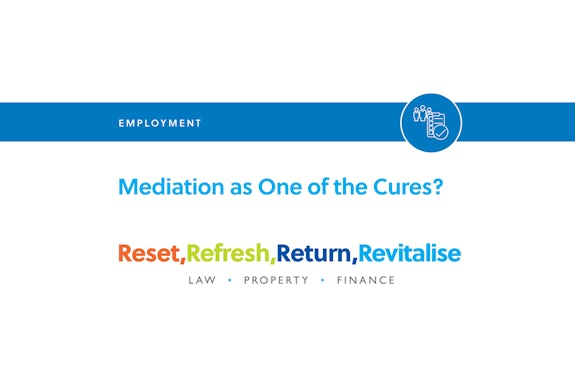
May 27, 2025

At a time of change, with the new 5 Tier system being introduced in Scotland and a return to work for many in Scotland delayed perhaps until the New Year, one certainty of the “new normal” is that social and commercial disputes will continue to arise.
The reality is that, at a time of increased conflict, many of the traditional pathways to resolution of disputes may be blocked for various reasons.
In a situation where public, third and private sector organisations require to focus attention and resources on moving forward, the Scottish courts and tribunals system presently has a significant backlog of cases which is likely to continue while the requirement rightly remains to give priority to the health and safety of users.
As a result, it is unlikely that the courts and tribunals system will be in a position to cope fully with the short to medium term requirement for fast, fair and effective dispute resolution. In many other difficult situations outside the justice system that requirement is also likely to be greater in the months ahead.
A number of business leaders, professional advisers and organisations across all sectors have joined together to invite the Scottish Government, publicly funded bodies, the Courts, third sector agencies and business organisations to address the situation by encouraging and making more use of mediation, and mediation skills, as a means to resolve disputes, manage difficult problems and build an effective post-pandemic economy.
Those involved argue that “mediation is a fast and cost-effective method for public sector, not for profit and business stakeholders to find solutions to the range of economic and social issues arising from Covid 19 – and more generally. It has a very good track record already. Mediation can be one of the cures to help alleviate some of the difficult challenges facing our economy and society as a whole.”
They also note that the UK Government, in guidance responding to the Covid-19 situation issued on 7th May 2020, said: “The Government would strongly encourage parties to seek to resolve any emerging contractual issues responsibly – through negotiation, mediation or other alternative or fast-track dispute resolution – before these escalate into formal intractable disputes“.
In 2019, a report by an Expert Group in Scotland recommended a number of steps, many of which could now be implemented, to place mediation at the heart of Scotland’s approach to dispute resolution. These recommendations have even greater importance and applicability in the emerging economic environment as we all seek to grapple with the impact of the pandemic in this country.
The time has now come to take action.
Endorsements
“The benefit of mediation is inestimable in terms of its positive impact on people’s lives. It brings disputes to a conclusion in a way that engages the decision-makers in the outcome. Litigation can create winners and losers; mediation gives all the participants a sense of control over a stressful part of their life. This is even more critical when we have no control over the pandemic and its implications for our health and socio-economic wellbeing.”
Tom Campbell, Executive Chair
North Coast 500 Limited
“Whilst the courts undoubtedly provide an essential public service as the default forum for the resolution of disputes and, perhaps most importantly, for the development of the law, I have never come across a dispute where the parties would not have benefitted in some way from the use of mediation. Right now, as Scotland begins its recovery from the Covid-19 pandemic, it is needed more than ever.”
Gareth Hale, Partner
Dentons UK & Middle East LLP
“In my experience, disagreements settled by mediation give those participating not only the opportunity to have a positive win-win experience, but also a vehicle for learning. During the pandemic there have been extra strains placed upon teams that we have never experienced before. Mediation through Zoom has been very effective in a short space of time in getting people to move forwards positively. A constructive and pro-active way forward for the economy would be for organisations to be made more aware of mediation as a positive and potentially speedy mechanism for resolving disputes.”
Pip Haydock, Managing Director
The 2Gether Partnership Ltd
“I have worked on social justice issues for twenty years- in Scottish and humanitarian contexts. The pandemic has clearly exposed the profound inequality that some face daily. The practice of mediation and principled negotiation offers an invitation to change with tools to navigate complex, emotive disputes in a more effective way – reducing negative impact on parties and providing respectful space for exploration. At its best, creativity is rekindled and relationships rebuilt. It is about enlarging and extending options for conflict resolution, and in no way detracting from other important routes to justice that may be available through the courts or other processes.”
Flora Henderson, Alliance Manager
Future Pathways, Scotland’s In Care Survivors’ Support Fund
“This mediation-focused Call to Action has my unequivocal support because it reflects the reality of the work regime in which we now live. As we are seeing around the world, the notion of going back to where we were is not a realistic option. We need to establish new and better ways of working. In essence, our business culture needs to change. We need to create the conditions for better conversations and better negotiations. The potential of mediation to do so online has already been proven.”
James CMcG Johnston OBE, Director
Transcend Change Limited
“The skills and techniques of mediation have huge benefit well beyond engaging in a formal mediation process. As I know from my own experience, open questioning, active listening, impartiality and respectful dialogue are powerful tools in management and relationship building.”
Fiona M Larg MBE, Chief Operating Officer and Secretary
University of the Highlands and Islands
“No one anticipated this disruptive pandemic. As we struggle back towards normal, with all of the uncertainty for parties’ legal rights, the best approach is undoubtedly to focus on resolution rather than on contractual rights. While negotiation can work where both parties are working towards the same goal, rarely in commercial disputes do both parties want the same end result and negotiation can then feel rather like trench warfare. Mediation, with an impartial mediator helping the parties come together, is supremely successful in overcoming such entrenchment. In the 15 years or so that I have been mediating with my clients, I have only ever participated in one mediation that did not result in resolution.”
Cat MacLean, Partner and Head of Dispute Resolution
MBM Commercial LLP
“The HR and employment law implications of the COVID-19 pandemic have been well-documented. Workplace disputes have not gone away during lockdown. In fact, some have festered; others have escalated quickly. Workplace disputes have always lent themselves very well to mediation. At the start of lockdown, we figured that mediation would also have to wait until social distancing was relaxed. However, online technology like Zoom has been incredibly effective for mediation. In one recent case, the experience for all concerned was just as ‘rich’. New ways of working have made mediation all the more important.”
David Morgan, Partner
Burness Paull LLP
“As an employment lawyer, I have found mediation to be the best way to resolve complex disputes which arise between employers and employees. Many employment related disputes, particularly those involving actual or perceived discrimination, have a high emotional content and mediation affords both parties the opportunity to voice and respond to underlying concerns and, having done so, to focus on obtaining a long-term resolution.”
Stuart Robertson, Partner, Head of Employment Law
Gilson Gray LLP
“As a millennial designer in favour of collaboration, transparency, creativity and communication, mediation seeks to get to the bottom of a problem, acknowledge and accept it, generate possible solutions and then test them. The result typically responds to the underlying issue and a successful mediation involves a positive outcome for both parties. It is a human-centred approach to conflict resolution. On the contrary, from the perspective of the “customer”, traditional litigation takes up a lot of time, causes huge stress and for at least 50% of those involved, the outcome is hugely negative. A move to favour mediation fits well with the Scottish Government’s vision for national wellbeing.”
Rosemary Scrimgeour, Co-founder
Building Workshop
“I’m an ombudsman, using investigation and adjudication as the default process for dispute resolution. It is a perfect method for examining the detail of the evidence, requiring redress and making recommendations for improvement. The outcome will inevitably be for or against, creating a winner and a loser. Ombuds are therefore increasingly using the techniques of mediation where the parties can explore what happened, how they feel about it, and find mutually acceptable solutions that allow trust to be restored and relationships rebuilt.
Lewis Shand Smith, Chair
The Business Banking Resolution Service
“Litigation is fundamental to dispute resolution, because its conclusions set the state’s expectations of societal behaviours. Bearing that in mind, I have found that mediation may best produce innovative and balanced solutions to diverse and evolving circumstances, for the benefit of willing stakeholders. Covid 19 is one such circumstance.”
Ross Taylor, Partner
Wright Johnston & MacKenzie LLP

Stuart attended The High School of Glasgow and studied law at the University of Strathclyde. He qualified as a solicitor in 1991 and has been a partner in three leading commercial legal firms in Edinburgh Glasgow and Aberdeen during his legal career.